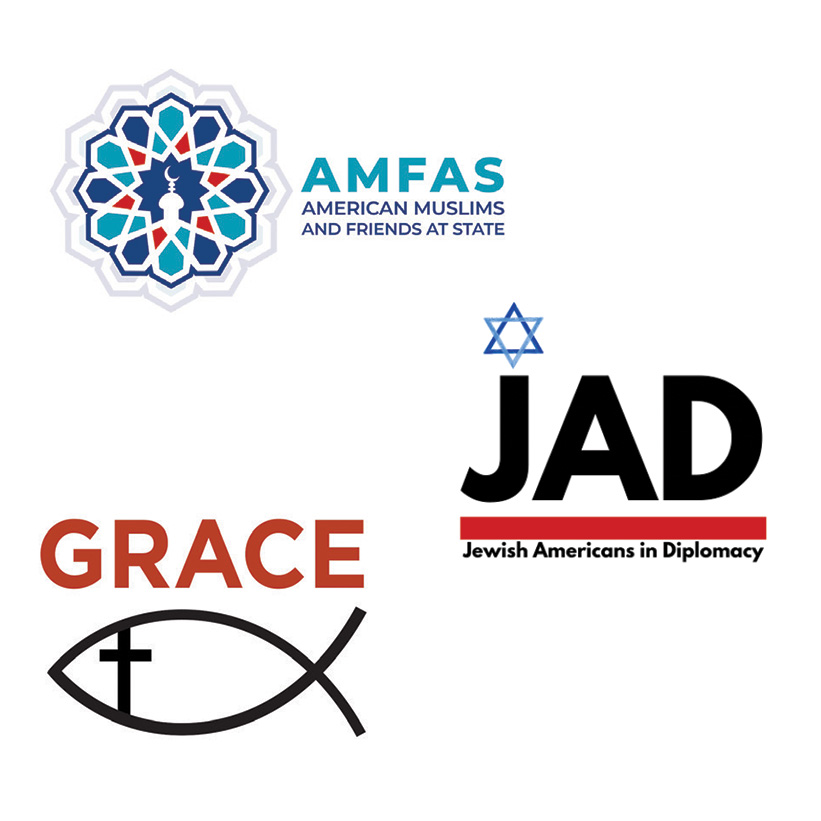Employee Organizations Advance Religious Inclusion at State
Three faith-based employee organizations are making strides in the realm of religious diversity and inclusion at the State Department.
BY THOMAS LYONS

Ben, a Foreign Service officer serving overseas, was happy to go to training. Serving in back-to-back overseas assignments and having arrived at post with no time for training during his permanent change of station, Ben felt lucky that post had authorized him to return to the Foreign Service Institute. The week of leadership training went well, and he got some time to catch up with some former colleagues.
The trouble arose after he returned to post and filed his travel voucher. “Voucher returned,” said the notification from E2. The comment read: “Traveler is not authorized lodging on Saturday following the end of training. Lodging should be paid at traveler’s expense.”
Rather than traveling back to post on Saturday, the first available travel day after training, Ben had indeed delayed until Sunday. In most normal circumstances, the comment from the voucher examiner makes sense. However, Ben, a practicing Orthodox Jew, could not travel on Saturday, the Jewish sabbath.
Prior to the trip, he had requested a religious accommodation from his supervisor, who was happy to comply when approving his travel authorization. The voucher examiner, however, was adamant there could be no exceptions. It was only after filing an EEO complaint, a lengthy and onerous administrative process, that Ben’s voucher was accepted and paid.
This situation, while perhaps not common, occurs more often than one might think and highlights the challenges many employees face when trying to maintain their professional work life while adhering to their religious beliefs. Adherents of many faiths—such as Seventh-day Adventists who also observe a Saturday sabbath, Sikhs who have special clothing requirements, and Muslims whose prayer times occur during the workday—may observe religious traditions that conflict with standard working hours and procedures.
As much as State Department officialdom stresses the need for inclusion and acceptance, many people of faith routinely feel their convictions are not respected, and in many cases, they are actively discouraged—often via social or even professional exclusion—from even revealing their religious beliefs at work.
Why the Exclusion?
There are a number of likely reasons for this, including a widespread misperception that because the State Department is a federal workplace, it must also be a completely secular one. There is also a belief that one’s freedom of religion is limited to private worship practices or personal belief, and not the free and open exercise of one’s faith.
Two other examples highlight this phenomenon. Some Muslim employees were stymied for years when they asked for a room at the Harry S Truman Building to be dedicated for Friday midday prayers. Department officials repeatedly told the group that such a prayer room, even if it wasn’t labeled as such, could not be allowed because “Main State is a federal government building.”
At around the same time, a Christian Diplomatic Security agent working in SA-20 asked a colleague if he wanted to meet up sometime for Bible study and prayer. His colleague informed him that a “secret” Christian group was already meeting, but it had strict “Fight Club” rules about discussing the existence of the group—because “if management finds out we’re praying at the office, they will shut it down.”
For both these groups, simply meeting together to pray during their breaks—something explicitly permitted under the Religious Freedom Restoration Act of 1993, the 1997 Clinton Guidelines on Religious Exercise and Religious Expression in the Federal Workplace, and the International Religious Freedom Act of 1998—was discouraged or even outright denied.
Much of the frustration many religious employees feel stems from misunderstandings and a lack of awareness about the rights that all employees enjoy. Fortunately, this situation is changing within State. The changes can be attributed in great measure to the hard work of the department’s three faith-based employee organizations (EOs): GRACE, Jewish Americans for Diplomacy (JAD), and American Muslims and Friends at State (AMFAS).
GRACE: The First Faith-Based EO
These three groups, all relatively new, have worked together to bring about a better understanding of the need for religious diversity and the inclusion of people of faith within the Department of State.
GRACE, the employee organization for Christians, faced significant backlash in its struggle to become the first recognized faith-based EO. Employees involved in the group’s creation even received hate mail. The Washington Post published an article that was at best skeptical, if not critical, of the new organization.
For years, many within the department, including at the top levels of leadership, felt an organization that represented the rights of religious employees had no place. Fortunately, in 2018, GRACE received formal recognition by State and opened the door for the formation of other faith-based groups.
Common Ground and Codification
While differing in religious convictions, the three faith-based EOs have found common ground in several areas that affect all people of faith within the department. One issue of particular importance to all three groups is codifying the department’s rules around religious accommodation.
Previously, requests for religious accommodation were dealt with rather arbitrarily by the individual’s immediate supervisor. As highlighted in the travel voucher example above, in several cases, supervisors had an inadequate understanding of the law and the department’s policy on this issue. They also lacked significant understanding of their employees’ religious beliefs and practices.
In one real-world example, a member of JAD requested a day off to observe a lesser-known Jewish holiday. His supervisor told him: “I researched this, and only a very small percentage of Jews celebrate this holiday, so unfortunately, you’ll have to work.” Although the supervisor’s comments and actions were clearly inconsistent with EEO law, because the department’s policies at that time were unclear regarding requests for religious accommodation, the employee had little recourse to rectify the situation, outside filing an EEO complaint.
To remedy this and other similar situations, GRACE, JAD, and AMFAS worked together to help draft and clear a new department regulation in the Foreign Affairs Manual—3 FAM 1530—to ensure a fair process for religious accommodation requests. The revised FAM chapter was published in October 2023.
In 2018, GRACE received formal recognition by State and opened the door for the formation of other faith-based groups.
Key to this effort was the cooperation among the three religious EOs. Together, they collaborated, researched relevant laws, and consulted with the offices of Diversity and Inclusion, Civil Rights, and the Legal Adviser. They then approached the Bureau of Global Talent Management (GTM) with one voice.
After the EOs shared common concerns and contributed to the draft of the new FAM chapter, the department published the new policy and then announced it through a department notice and an ALDAC cable. This was a significant win, not only for people of faith but also for the religious EOs, which, after once being told they could not exist, now have their voices heard by department leadership and are making positive changes for the workforce.
The new FAM chapter on religious accommodation states that frontline supervisors may approve religious accommodation requests, but denials of religious accommodation requests may only come from bureau Executive Office (EX) directors, and decisions must be made “as soon as practical.” Denials from bureau EX directors must be in writing, with an explanation based on objective standards.
Even so, employees maintain the right to appeal the denial through the EEO process. The new steps outlined in the FAM add more accountability to the process, bring the State Department’s policy closer in adherence to federal law, and afford greater protections for employees to live out their beliefs.
Abiding by Key Tenets
Employees’ right to religious expression in the workplace is derived from the First Amendment to the Constitution. Those rights, including the right to free speech and religious expression, do not disappear simply because one chooses to work for the federal government. In fact, the federal workplace, primarily comprising people who have taken an oath to support and defend the Constitution, should be the one workplace in America where an individual’s constitutional rights are most protected.
The respect for employees’ religious freedom is also a critical part of the department’s diversity, equity, inclusion, and accessibility (DEIA) initiatives. People of faith who work for State should feel included and valued—not in spite of their faith but because of it. No one should feel as if expressing their faith at work would be a source of exclusion.
The department’s DEIA tenets consistently emphasize the need for the department’s workforce to “look like America.” According to a 2022 survey on Statista, 74 percent of the U.S. population identifies with some religious belief. Of those, 41 percent regularly attend religious services. Broadening State’s religious diversity, including affirmative measures to include and celebrate our religious colleagues, is crucial to meeting our DEIA goals and makes the department more representative of the people we serve.
Raising Awareness
Although the FAM revision was a significant step toward greater inclusion and tolerance of religious faith in the workplace, the next step is to raise awareness. The three faith-based EOs are again sharing in this work and doing it both formally and informally. Informally, their members are unapologetically being their authentic selves and simply being more open about faith at work. Even the mere existence of the three employee organizations is a tangible sign of greater acceptance of religious diversity.
In particular, the department’s formal recognition of employee organizations based on religion sends a clear signal to all employees that these organizations and the people they represent are legitimate and valued parts of the workforce.
The organizations are making themselves visible in other, more formal ways as well. Following the terrorist attack by Hamas on Oct. 7, 2023, JAD, AMFAS, and GRACE came together to organize a “Moment of Silence for Unity and Peace” on Oct. 30 and a “Gathering of Solidarity for Peace” on Nov. 29.
Held at State and attended virtually by posts around the world, these two events demonstrated the groups’ shared values of condemning hate and terrorism while exemplifying a spirit of interreligious harmony. One included readings of scripture from each religion, as well as other faith traditions, and served as a clear example of how employees can visibly and explicitly express their faith in the workplace.
Finally, the three employee organizations are working closely with department leadership—including the Office of Diversity, Equity, Inclusion, and Accessibility, FSI, and GTM—to ensure all employees and managers are aware of best practices to accommodate employees of faith in the workplace.
The Aim—and Hope
In January and February 2024, the governing boards of JAD, GRACE, and AMFAS met with GTM’s Chief Labor Management Negotiator Steve Polson and Dean of FSI’s Leadership and Management School Tom Vajda to discuss the role of the three EOs in the department’s broader DEIA initiatives and the development of professional training for employees on religious inclusion and accommodation.
The hope of the EOs is that these efforts will ultimately educate and inform the department’s workforce and ensure that religious employees are treated fairly and consistent with their constitutional rights and that managers, in particular, are better equipped to manage requests for religious accommodation.
Employees of faith make up a valued part of the mosaic of diversity within the department. Allowing those employees to express their faith freely, consistent with the First Amendment, and have their requests for religious accommodation fairly and equitably adjudicated is integral to the department’s DEIA initiatives.
These faith-based employee organizations are working hard—and, critically, working together—to raise the profile of people of faith and to advocate for greater religious inclusion in the workplace. GRACE, JAD, and AMFAS are proud to take their place alongside other identity-based employee organizations to protect the rights of individual employees and improve the diversity of the department.
When sharing or linking to FSJ articles online, which we welcome and encourage, please be sure to cite the magazine (The Foreign Service Journal) and the month and year of publication. Please check the permissions page for further details.
Read More...
- “Achieving Full Diversity in the Foreign Service” by Ajit Joshi, The Foreign Service Journal, November 2004
- “Religious Diversity Benefits the State Department” by Phil Skotte, The Foreign Service Journal, December 2017
- “Making Diversity and Inclusion Real in Foreign Affairs” reports from the Employee Affinity Groups, The Foreign Service Journal, October 2020




